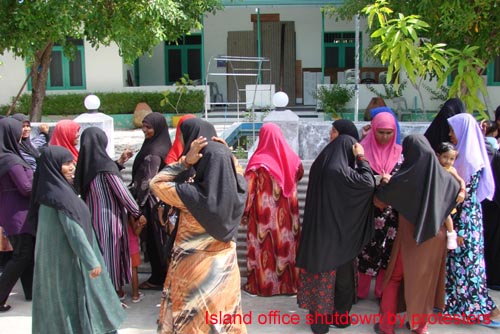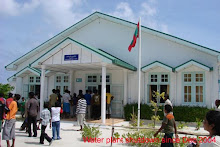The ministry of fisheries and agriculture has extended the moratorium on reef shark fishing to cover the territorial waters of the Maldives, as part of a historic move towards a total ban on both reef and oceanic shark hunting.
A ten-year moratorium was imposed in 1998 to cover the seven atolls where tourism had been established on the assumption that many tourists visited the Maldives to see sharks.But with the spread of tourism to almost all atolls in the country, the ministry has decided to expand the ban to encompass all reef shark fishing across the Maldives within a 12 nautical mile radius.
Marie Saleem, a reef ecologist at the marine research centre and one of those at the forefront of the campaign to ban shark hunting, said she was both “excited” and “relieved” to hear that the efforts of those who had been pushing for a ban were “finally fruitful”.Reef shark populations would now need to be monitored as a matter of urgency in order to observe the effectiveness of the ban, she said.Total banAbdullah Nasir, permanent secretary of the fisheries ministry, has said:
“The fisheries law clearly tells us that we can protect any marine species if we feel that it’s threatened or endangered for any reason.”Although oceanic shark fishing is yet to be prohibited by law, Nasir said the ministry was “working towards that” and had set itself a target of banning the export of shark products, both oceanic and reef, within one year.
“We have taken very strong action against the protection of sharks simply because they were protected worldwide and are very important for tourism.” As sharks reproduce at a slow rate their populations cannot handle large-scale fishing pressure.
Speaking to Minivan News in December, Guy Stevens, senior marine biologist at Four Seasons resorts, said: “It takes decades and decades for the shark population to recover, but it doesn’t take long to wipe out.”
NGO Shark Alliance estimates tens of millions of sharks are killed globally each year either as by-catch or intentionally. The lucrative market for shark fins in Asia, where shark-fin soup is considered to be a delicacy, is believed to be increasing each year.
LivelihoodsOne of the hurdles faced by the ministry is the need to find alternative livelihoods for the 100 or so fishermen whose incomes depend on shark fishing.“We need to work with the fishermen to identify alternative livelihoods and to compensate them,” said Marie.“I feel that the tourism industry should play a large role in this change and take the responsibility of compensating the fishermen as they are the ones reaping the benefits out of the loss of fishermen.”
Nasir said the government was in the process of finding other means of income for these fishermen.Robert Tomasetti, a marine biologist at Banyan Tree resort, has said that as shark fishing is not a traditional fishery, the ban should be easier to enforce than the ban on turtle hunting.
“I think that there are only about 100 to 200 shark fishermen and it’s mostly seasonal; other times of the year they will be fishing tuna. Whenever we take something away, we have to provide another source of income.”EnforcementTomasetti stressed the importance of making the leap between “rhetoric and reality”. He said although the move showed live sharks were more valuable for tourists than dead sharks, the ban on sea turtle hunting had proved ineffective. “I think it’s a success but I just hope it will be followed through with action. This government seems to be very environmentally friendly.”One of the ways in which the ban will be enforced is by monitoring exports. But, said Tomasetti, “It’s difficult unless you are a specialist or trained well, to tell the difference between fins of some species and another.”He said it was possible fishermen would hunt reef sharks and palm them off as another species, which is why a total ban was essential.
“Ocean fishery is generally less targeted because of the cost of fuel but maybe they will shift towards these sharks because they can’t fish reef sharks.”The extension to all atolls will help the ministry of fisheries check and control reef shark hunting, said Nasir.
He added the responsibility of enforcement would need to be shared by atoll offices and the police as well as the ministry.The ministry would ensure customs staff received further training so officers could learn to spot different shark-related products, he said."Tremendous"A recent report by Stevens noted nationwide whale shark excursions were responsible for generating around US$10 million annually while shark hunting produces about US$100,000 a year.
Mohamed Sim Ibrahim, the secretary general of the Maldives Association of Tourism Industry, said the effect of the ban on the tourism industry would be “tremendous”. The long-term effect on the revival of the shark population would need to be monitored along with its impact on tuna fisheries.Crudely put, observations have shown a positive link between shark and tuna populations, he said.“Instead of reducing these species or hunting them to extinction, we are thinking positively about conserving them and keeping them, adding more value to the tourism experience.
”According to Sim, around 30 per cent of tourists visit the Maldives for its underwater marine life and in addition to manta rays, sharks would be “their number one priority”.







